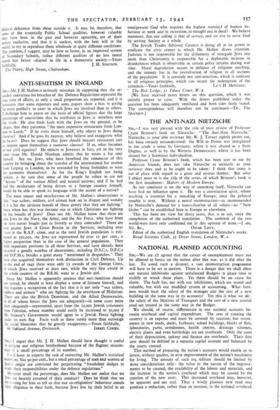THE ANTI-NAZ1 NIETZSCHE
Six,—I was very pleased with the title of your review of Professor Crane Brinton's book on Nietzsche : " The Anti-Nazi Nietzsche." Nietzsche, as your able reviewer Mr. W. J. Turner rightly points out, has been entirely misunderstood: the Will to Power was interpreted in too crude a sense by Germany, where it was abused as a State Dogma, as well as by the Western Democracies, where it has been abused for a licentious individualism.
Professor Crane Brinton's book, which has been sent to me by American friends, does not take Nietzsche as seriously as your reviewer does and as he ought to be taken: I think that irony is out of place with regard to a great and serious thinker. But what I object most to is the title of the series, of which Brinton's book is the first instalment: Makers of Modern Europe.
As our continent is on the way of unmaking itself, Nietzsche can have had no influence upon it. He was a constructive spirit, whose teaching is essential for a remaking of Europe, once the political trouble is over. Without a moral reconstruction—as recommended by Nietzsche's demand for a transvaluation of all values—no " New Order " can be established here in Europe or elsewhere.
This has been my view for thirty years, that is to say, since the completion of the authorised translation. The outbreak of the two world-wars have only confirmed me in this opinion of mine.—I am,
Editor of the authorised English translation of Nietzsche's works. Royal Societies Club, 35 Dover Street, London, W. i.


























 Previous page
Previous page